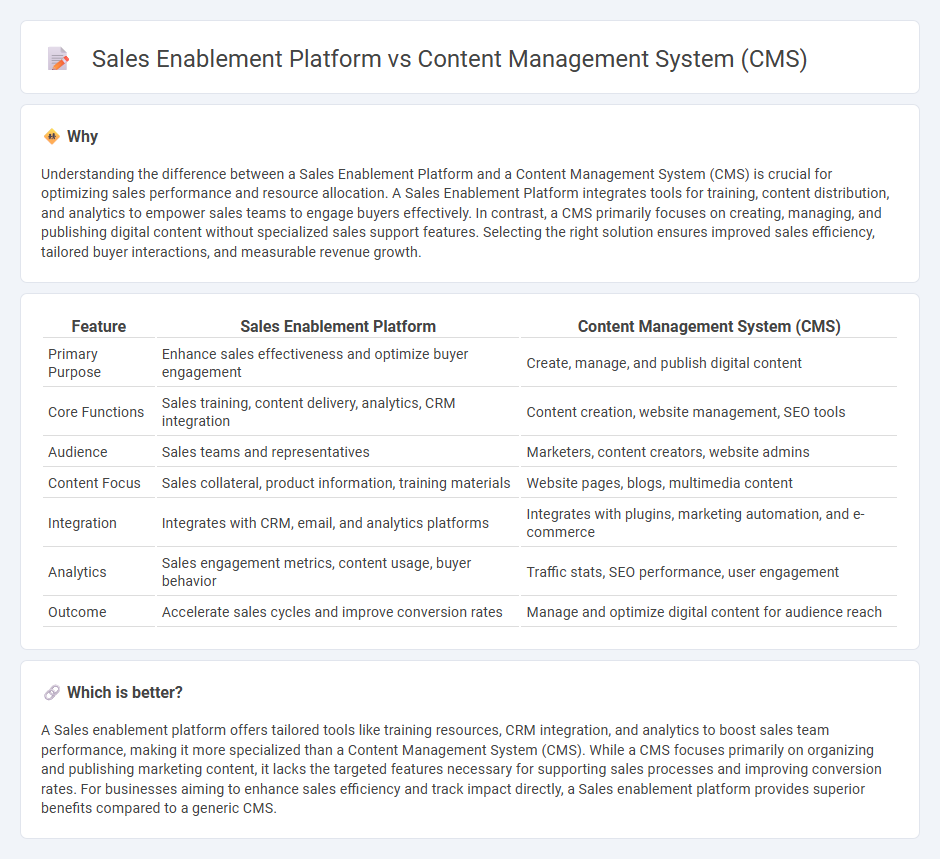
Sales enablement platforms streamline the sales process by providing targeted tools, analytics, and training materials tailored to improve sales team performance, while Content Management Systems (CMS) focus primarily on organizing, storing, and publishing digital content across various channels. Unlike CMS, sales enablement platforms integrate customer insights, real-time performance tracking, and automation to directly boost sales effectiveness and conversion rates. Explore how aligning the right platform with your sales strategy can accelerate revenue growth and enhance team productivity.
Why it is important
Understanding the difference between a Sales Enablement Platform and a Content Management System (CMS) is crucial for optimizing sales performance and resource allocation. A Sales Enablement Platform integrates tools for training, content distribution, and analytics to empower sales teams to engage buyers effectively. In contrast, a CMS primarily focuses on creating, managing, and publishing digital content without specialized sales support features. Selecting the right solution ensures improved sales efficiency, tailored buyer interactions, and measurable revenue growth.
Comparison Table
| Feature | Sales Enablement Platform | Content Management System (CMS) |
|---|---|---|
| Primary Purpose | Enhance sales effectiveness and optimize buyer engagement | Create, manage, and publish digital content |
| Core Functions | Sales training, content delivery, analytics, CRM integration | Content creation, website management, SEO tools |
| Audience | Sales teams and representatives | Marketers, content creators, website admins |
| Content Focus | Sales collateral, product information, training materials | Website pages, blogs, multimedia content |
| Integration | Integrates with CRM, email, and analytics platforms | Integrates with plugins, marketing automation, and e-commerce |
| Analytics | Sales engagement metrics, content usage, buyer behavior | Traffic stats, SEO performance, user engagement |
| Outcome | Accelerate sales cycles and improve conversion rates | Manage and optimize digital content for audience reach |
Which is better?
A Sales enablement platform offers tailored tools like training resources, CRM integration, and analytics to boost sales team performance, making it more specialized than a Content Management System (CMS). While a CMS focuses primarily on organizing and publishing marketing content, it lacks the targeted features necessary for supporting sales processes and improving conversion rates. For businesses aiming to enhance sales efficiency and track impact directly, a Sales enablement platform provides superior benefits compared to a generic CMS.
Connection
Sales enablement platforms integrate seamlessly with Content Management Systems (CMS) to streamline the creation, organization, and distribution of sales content tailored to buyer personas and stages. This connection enhances sales team efficiency by providing instant access to up-to-date presentations, case studies, and product information within a centralized repository. Leveraging data analytics from both systems improves content relevance and personalization, driving higher engagement and conversion rates in the sales pipeline.
Key Terms
Content Organization
A Content Management System (CMS) centralizes content storage, enabling efficient categorization and retrieval through metadata and taxonomy frameworks, which streamlines content organization for marketing teams. Sales enablement platforms integrate content organization with sales analytics, tailoring content delivery based on buyer personas and engagement metrics to enhance sales effectiveness. Explore how these platforms differ in content organization strategies to optimize your business workflow.
Sales Collateral Distribution
A Content Management System (CMS) efficiently organizes and stores sales collateral, but a Sales Enablement Platform optimizes distribution by providing analytics, personalized content recommendations, and seamless integration with CRM tools, enhancing sales team effectiveness. Sales Enablement Platforms ensure real-time access to the most relevant materials, which improves sales productivity and alignment with buyer needs. Explore the advantages of integrating a Sales Enablement Platform to maximize collateral distribution and boost sales performance.
Analytics & Reporting
Sales enablement platforms provide comprehensive analytics and reporting tools that track content usage, engagement metrics, and sales performance, enabling data-driven decisions to improve sales strategies. Content Management Systems (CMS) typically focus on content creation, management, and distribution but offer limited analytics capabilities mainly related to content performance. Discover more about how detailed analytics in sales enablement platforms can transform your sales outcomes.
Source and External Links
Content management system - A CMS is software for managing digital content creation and modification, commonly used for enterprise and web content management, often including a user-friendly front-end for content editing and a back-end that compiles and delivers content online.
What is a content management system (CMS)? - A CMS enables users without coding expertise to create, manage, and publish digital content via a collaborative dashboard with features like digital asset management, workflow permissions, and multi-channel distribution.
What Is A Content Management System (CMS)? - A CMS helps teams create, edit, organize, and publish web content through a user-friendly interface, separating front-end presentation from back-end content management, facilitating collaboration and reducing technical overhead.
 dowidth.com
dowidth.com